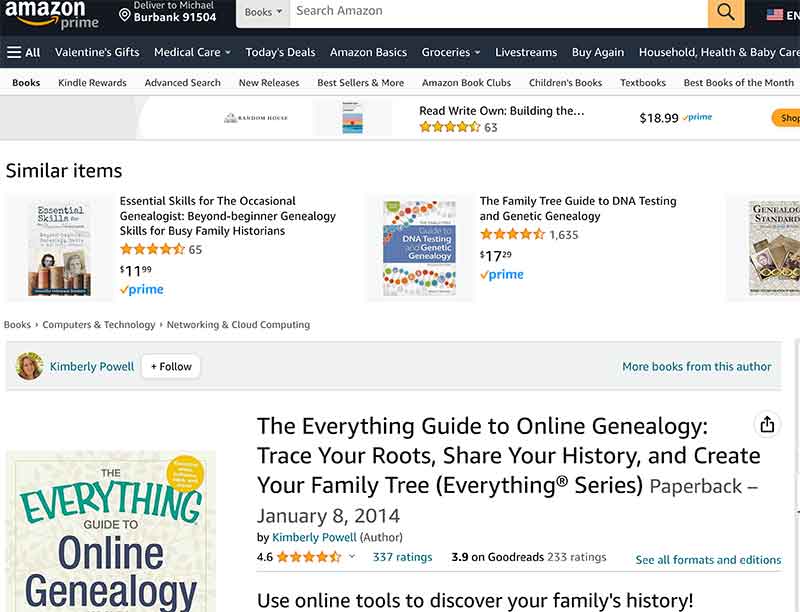Jose Mier researches from Sun Valley, CA about genealogical matters. This includes finding books that might be of interest to others undertaking family history research.
Genealogy, the study of family history and the tracing of one’s ancestry, has gained immense popularity in recent years. As individuals seek to uncover the mysteries of their past and connect with their roots, the demand for comprehensive and insightful books on genealogy has grown. This article explores some of the best books on genealogy, offering a diverse selection that caters to beginners and seasoned researchers alike.
- “The Complete Idiot’s Guide to Genealogy” by Christine Rose and Kay Germain Ingalls (2012): A perfect starting point for beginners, this comprehensive guide takes a lighthearted approach to a potentially overwhelming subject. Covering the basics of genealogy research, it provides practical tips on gathering information, using online resources, and organizing data. With its easy-to-follow format and accessible language, this book helps demystify the complexities of genealogy for those just starting their journey.
- “Ancestry’s Guide to Research: Case Studies in American Genealogy” by Johni Cerny and Arlene Eakle (2014): For a more hands-on approach, this book offers a series of case studies that demonstrate various research methods. By examining real-life examples, readers can learn effective techniques for overcoming common research challenges. The book covers a range of topics, from deciphering handwritten records to using DNA testing in genealogy. It’s a valuable resource for individuals looking to enhance their research skills and tackle complex genealogical puzzles.
- “Evidence Explained: Citing History Sources from Artifacts to Cyberspace” by Elizabeth Shown Mills (2015): Citing sources is a crucial aspect of genealogical research, and Elizabeth Shown Mills is a leading authority on the subject. “Evidence Explained” is a comprehensive guide to citation formats for a wide range of historical sources, including digital and online materials. Mills provides clear and detailed explanations, making it an indispensable reference for genealogists striving for accuracy and professionalism in their work.
- “The Family Tree Guide to DNA Testing and Genetic Genealogy” by Blaine T. Bettinger (2019): As DNA testing becomes an increasingly integral part of genealogical research, this book by Blaine Bettinger is a must-read. It offers a comprehensive overview of genetic genealogy, explaining the science behind DNA testing and how it can be used to trace one’s ancestry. Bettinger guides readers through the process of selecting the right test, interpreting results, and incorporating DNA evidence into their family history research.
- “Professional Genealogy: Preparation, Practice & Standards” edited by Elizabeth Shown Mills (2018): For those aspiring to become professional genealogists or seeking a deeper understanding of the field, this book is an authoritative guide. Edited by Elizabeth Shown Mills, it brings together contributions from experienced professionals, covering a wide range of topics such as ethical standards, business practices, and advanced research methodologies. It serves as a valuable reference for anyone looking to elevate their genealogical research to a more professional level.
- “Unofficial Guide to Ancestry.com: How to Find Your Family History on the No. 1 Genealogy Website” by Nancy Hendrickson (2018):com is a powerhouse in the world of genealogy, and this guide by Nancy Hendrickson is an essential companion for navigating the platform. From building a family tree to accessing historical records, the book provides step-by-step instructions and insider tips to maximize the use of Ancestry.com. It’s a practical resource for both beginners and experienced researchers looking to harness the full potential of this popular genealogy website.
- “How to Archive Family Keepsakes: Learn How to Preserve Family Photos, Memorabilia & Genealogy Records” by Denise May Levenick (2012): Preserving and organizing family artifacts is a crucial aspect of genealogy. In this book, Denise May Levenick offers practical advice on how to properly archive and care for family keepsakes, from photographs to heirlooms. With a focus on both physical and digital preservation, the book provides valuable insights into maintaining the longevity of precious family treasures.
- “Black Roots: A Beginner’s Guide to Tracing the African American Family Tree” by Tony Burroughs (2001): Tracing African American ancestry comes with its unique set of challenges due to the historical impact of slavery. Tony Burroughs, a renowned genealogist specializing in African American research, provides valuable guidance in this comprehensive guide. The book addresses specific research strategies, resources, and historical context that are essential for those exploring their African American heritage.
- “The Researcher’s Guide to American Genealogy” by Val D. Greenwood (2017): Widely regarded as a classic in the field, this book by Val D. Greenwood is an excellent resource for anyone serious about American genealogical research. Covering both fundamental and advanced research methodologies, it offers a systematic approach to uncovering family history. The book includes discussions on various types of records, repositories, and strategies for overcoming research obstacles.
- “Courthouse Research for Family Historians: Your Guide to Genealogical Treasures” by Christine Rose (2004): Courthouse records are a goldmine for genealogists, providing a wealth of information not available elsewhere. Christine Rose’s book is a comprehensive guide to courthouse research, offering practical advice on accessing and interpreting various records. From wills and deeds to probate records, the book equips researchers with the knowledge and skills needed to navigate courthouse archives successfully.

In conclusion, the world of genealogy is vast and fascinating, and these books offer a diverse array of resources to guide individuals at different stages of their research journey. Whether you’re a beginner looking for a gentle introduction or an experienced researcher seeking advanced methodologies, these books provide valuable insights, techniques, and inspiration for uncovering the rich tapestry of your family history. Happy researching!